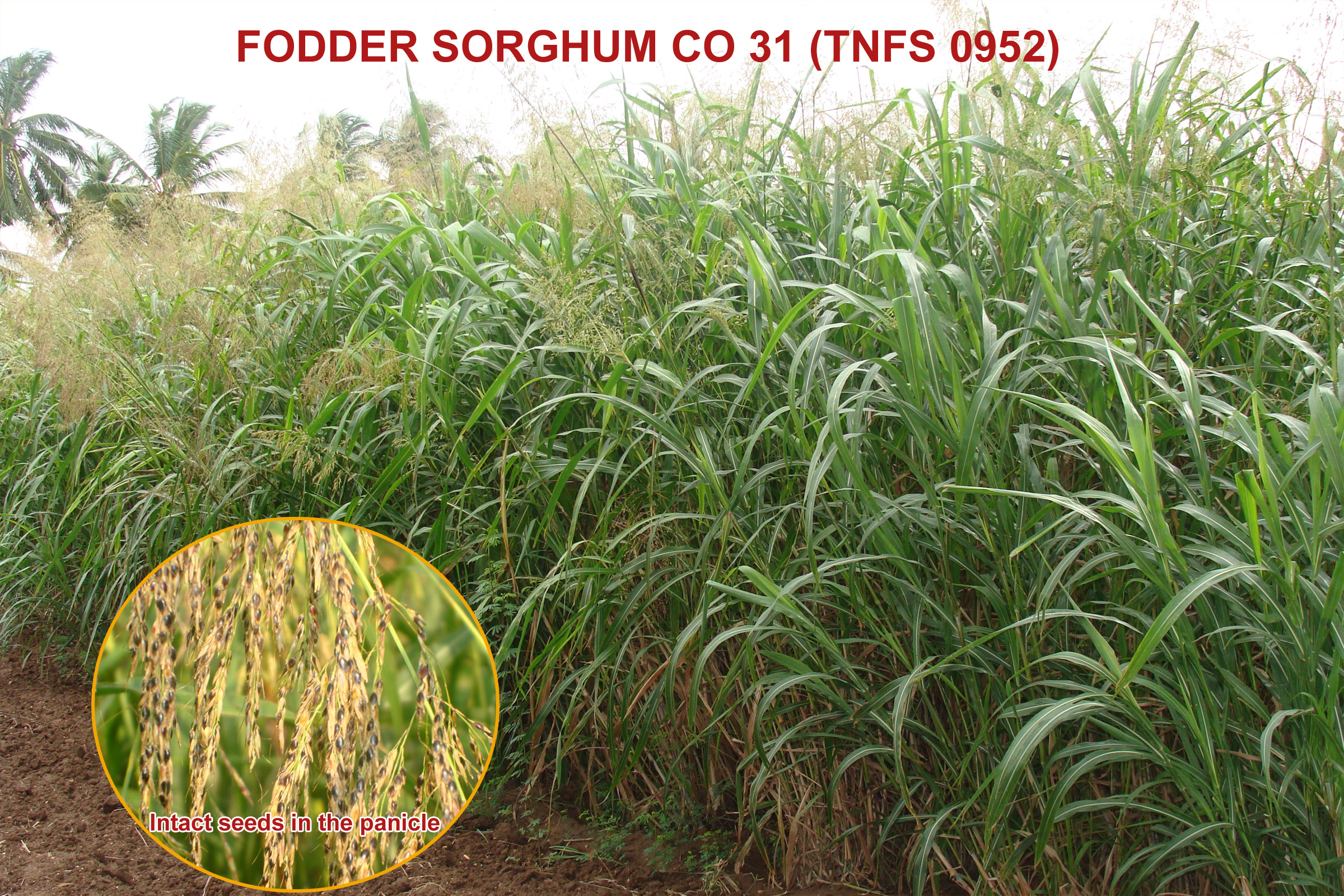|

Season and Varieties
| District / Season |
Month |
Varieties |
| Irrigated |
|
CO (FS) 29 & CO 31 (Multicut Cholam) |
| All Irrigated districts |
Jan - Feb and Apr – May |
| Rain fed |
|
| All Districts |
(Jun - Jul) |
Yield Potential and Quality Characters
| PARTICULARS |
CO (FS) 29 |
CO 31 |
| Parentage |
Derivative of the cross TNS 30 x Sorghum sudanense |
Gamma ray (400 Gy) mutant of CO (FS) 29
|
| Duration (Days) |
Multicut
(3 years) |
Multicut
(3 years) |
| Average green fodder yield (t/ha) |
160-170 (6-7 cuts) |
190-(6-7 cuts) |
| Morphological characters |
| Plant height (cm) |
220-250 |
270 - 290 |
| Number of tillers |
10-15 |
12-17 |
| Number of leaves |
80-105 |
90-110 |
| Leaf length (cm) |
75-90 |
85 - 95 |
| Leaf breadth (cm) |
3.5-4.6 |
4.5 - 5.0 |
| Leaf stem ratio |
0.2-0.25 |
0.26 |
Quality Characters |
| Protein content (%) |
8.41 |
9.86 |
| Dry matter (%) |
23.60 |
25.9 |
| Crude fibre (%) |
25.60 |
19.80 |
| IVDMD (%) |
50.30 |
52 |
Note: Fodder Cholam can be intercropped with CO 5 and CO (FC) 8 Cowpea at 1:1 ratio and harvested together to provide nutritious fodder.
Crop Production:
1. |
Preparatory cultivation |
: |
Plough 2-3 times to obtain a good tilth. Form ridges and furrows of 6 m long and 60 cm apart. Spread 25 tones of FYM/ha before ploughing and incorporate well. |
2. |
Seed rate |
: |
5 kg / ha |
3. |
Spacing |
: |
30 x 15 cm (Sow on both sides of ridges) |
4. |
Fertilizers |
: |
Basal: 45 : 40 : 40 kg NPK/ha
Top dressing: 45 kg N at 30 days after sowing
After each harvest, apply 45 kg N/ha as basal.
After first year apply 45:40:40 kg NPK/ha |
5. |
Weed Management |
: |
First weeding on 25-30 DAS. There after based on necessity. |
6. |
Water Management |
: |
Once in 7-10 days depending upon soil condition. |
7. |
Harvest |
: |
First harvest at 75-80 days after sowing and subsequent harvests once in 50 days |
8. |
Green fodder yield |
: |
190 t/ha/year in 6-7 harvests |
Crop Protection:
Shoot fly (Atherigona soccata)
Symptoms
- Dead heart symptom at seedling stage (upto 30 days) .
- Dead heart plant with rotting smell pulled out easily.
- Side tillers production.
Identification of Pest
- Egg: white, cylindrical, distal end somewhat flattened (Cigar shaped).
- Maggot: Dirty white and apodous, later yellow and 6 mm long.
- Pupa: Brown puparium
- Adult: whitish grey female fly.
Management
- ETL: 10% dead hearts or 1 egg / plant.
- Sow immediately at the onset of monsoon rains.
- Seed treatment : Imidacloprid 70 WS @ 10 g/kg of seeds.
- Set up hanging plastic fishmeal trap @ 12 nos. /ha upto 30 DAS.
Aphids (Rhopalosiphum maidis)
Symptoms
- Plant yellow and wilt with large number of aphids.
- Honeydew secretion, sooty mould on leaves.
Identification of insect pests
- Nymphs: light green.
- Adults: Bluish or olive green adults.
Management
- Conservation of several parasitic wasps, ladybird beetles, syrphid fly larvae, and lacewing larvae and adults.
Seed production
Land Requirements
- Land shall be free of volunteer plants including sudan grass.
Field Standards
A. General Requirements
- Isolation: Fields shall be isolated with following specified isolation distances.
Contaminants |
Minimum distance (meters)
|
| Foundation |
Certified |
| Fields of other varieties of grain and dual-purpose sorghum |
200 |
100 |
| Fields of same variety not confirming to varietal purity requirements |
200 |
100 |
| Johnson grass (Sorghum halepense (L.)) and other grassy Sorghum spp. |
400 |
400 |
B. Specific Requirements
| Factor |
Maximum permitted (%)*
|
| Foundation |
Certified |
| Off-types at any one inspection at and after flowering |
0.10 |
0.20 |
| *Heads infected by Kernel smut or Grain smut (Sphacelotheca sorghi) and Head smut (Sphacelotheca reiliana) at final inspection |
0.050 |
0.10 |
*Seed fields can be certified if diseased earheads are removed and infection should not more than maximum permissible level on re-inspection,. Only one such re- inspection is permitted.
Note: Seed fields should be thoroughly rogued for sugary disease/ergot infected plants so as to meet the seed standards However, seed fields shall not be rejected for the infected earheads.
- Seed rate: 5 kg/ha .
- Seed treatment: Treat the seeds with 600 g of Azospirillum and 600g of Phosphobacteria or 1200g of Azophos.
- Spacing: 50 x 20 cm.
Factor |
Standards for each class
|
| Foundation |
Certified |
| Pure seed (minimum) |
97.0% |
97.0% |
| Inert matter (maximum) |
3.0% |
3.0% |
| Other crop seeds (maximum) |
5/kg |
10/kg |
| Weed seeds (maximum) |
5/kg |
10/kg |
| Other distinguishable varieties (maximum) |
10/kg |
20/kg |
| Ergot (Claviceps spp.) sclerotia, seed entirely or partially modified as sclerotia, broken sclerotia or ergotted (Sphacelia sorghi & Claviceps spp.) seeds (maximum) |
0.020%
(by no.)
|
0.040%
(by no.)
|
| Germination (minimum) |
75% |
75% |
| Moisture (maximum) |
12.0% |
12.0% |
| For vapour-proof containers (maximum) |
8.0% |
8.0% |
|

